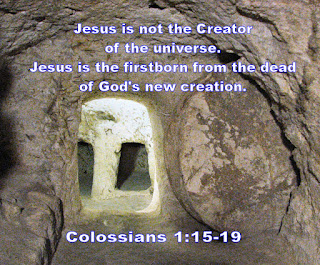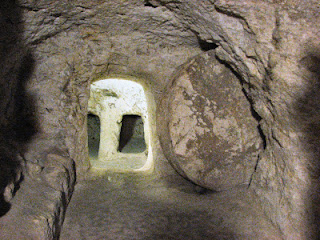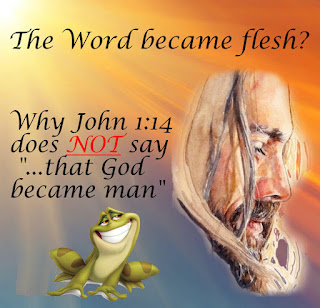Colossians 1:15-19, Jesus is not the Creator, but Jesus is the beginning of God's new creation
Does Paul describe Jesus as the Creator in Colossians
1:15-19?
No, rather Paul says that Jesus is the firstborn
from the dead of the new creation.
To listen to these notes in an expanded podcast, click here:
To listen to these notes in an expanded podcast, click here:
https://anchor.fm/onegodreport-podcast/episodes/Is-Jesus-the-Creator-in-Colossians-115-19--No--but-Jesus-is-the-beginning-of-Gods-new-creation-eavruf
1. Interpreting Colossians 1 as saying that somehow Jesus was involved in the Genesis creation, and is therefore God, contradicts Paul’s other statements about the relation of Jesus to God. The “Genesis creation” interpretation also contradicts many other Scriptures. The Old Testament says nothing about a second god figure who created (cf. Deut. 32:6, Isa. 44:24). Jesus attributed the creation of humanity to “He who made them”, not “they” or “we who made them”.
In the letter to the Colossians, Paul distinguished Jesus from God. E.g., Colossians 1:1-3. “God our Father” – all of God, not just one person of a godhead, is our Father. “We always thank God, the Father of our Lord Jesus Christ, when we pray for you”. And Col. 3:1 “Christ is…seated at the right hand of God”.
In a parallel and similar book to Colossians (written about the same time from prison in Rome c. AD 60), Paul says in Ephesians 1:3 and 1:17 “Blessed be the God and Father of our Lord Jesus the Messiah” “That the God of our Lord Jesus the Messiah, the Father of glory, may give you a spirit of wisdom…” Jesus is clearly distinguished from God, who is also called the Father. See also Scriptures like 1 Tim. 2:5: “There is one God, and one mediator between God and men, a man Christ Jesus…”
To interpret Colossians 1:15-19 as Paul saying that “Jesus is God” contradicts so much else of what Paul wrote in this book, in the parallel book of Ephesians and in so many other places.
The theme of Colossians 1:15-19 is that Jesus is pre-eminent, not because Jesus is God, but because God has put the exalted man Jesus in this pre-eminent position. Cf. Matthew 28:18: “all authority in heaven and on earth has been given to me”.
2. Colossians 1:15-19 is best understood in context of a new beginning that God has undertaken in Christ. In other words, in Christ, God has begun creation renewal. Note the context of Col. 1:12-14 is that believers are transferred from the kingdom of darkness by God into the kingdom of God’s beloved son. In this passage Jesus is called the firstborn from the dead ones, the beginning of God’s creation.
If one is the beginning of creation, the firstborn of creation, and the firstborn from the dead, you are not God. God is not created and God does not die. Nor is God raised to life again. So Colossians 1:15-19 is much better understood in the context of new creation which God brings about through the risen Jesus.
Unfortunately, as a Trinitarian I did not understand the idea of the new creation, of the restoration, renewed life that God has worked in Messiah Jesus and has in store for us in Messiah Jesus (cf. Matt. 19:28, "in the regeneration, in the new world"). Instead, passages like Colossians 1:15-19 are wrongly shoved back into the Genesis creation, causing confusion and robbing the hope of renewed life in the kingdom of God's Son (Col. 1:13).
Unfortunately, as a Trinitarian I did not understand the idea of the new creation, of the restoration, renewed life that God has worked in Messiah Jesus and has in store for us in Messiah Jesus (cf. Matt. 19:28, "in the regeneration, in the new world"). Instead, passages like Colossians 1:15-19 are wrongly shoved back into the Genesis creation, causing confusion and robbing the hope of renewed life in the kingdom of God's Son (Col. 1:13).
3. Paul describes Jesus as “the image of the invisible God” (1:15). This is an obvious comparison to the first man Adam (Gen. 1:26-27, 9:6) and again fits the context of renewed creation in Jesus a human being. If this was describing the Genesis creation, Paul would not be correct. Adam was the firstborn of the Genesis creation. But Paul sees in Jesus a kind of ideal Adam. In Paul’s other letters he directly compares Jesus to Adam (Rom. 5:12-21, 1 Cor. 15:22, 45).
To be “the image of God” means you are not God. You may be representing God, but you aren’t God. Jesus is the image of the invisible God. Cf. 1 Tim. 1:17. The only God is invisible. Jesus was seen. It doesn’t make sense to say Jesus is God.
4. Jesus is the firstborn of all creation. The word “firstborn” (Greek prototokos) can relate to either time or rank, as to an eldest child or a person of pre-eminent rank.
If Jesus is born and is part of creation, he is not God who created. Rather, Jesus, as being the firstborn from the dead (1:18), is the firstborn of the new, or renewed creation. Resurrection is creation renewal.
Paul doesn’t make any differentiation between the divine Jesus, or a Jesus having two different natures, which is all later philosophical speculation entirely foreign to Scripture. Paul is talking about the “Son” of God. The Son of God is the firstborn of creation.
Again, these truths place Colossians 1:15-19 in a new creation context. The idea of the firstborn comes from the Old Testament. Israel is God's firstborn son. Psalm 89:26-27 is a direct parallel, as the Davidic descendant who calls Yawheh “my God, my Father” is called the firstborn to whom God gives rule over the kings of the earth. Jesus is the ideal Israel, the ideal Davidic king.
Paul is probably thinking about passages like Psalm 89:26 which state that the Davidic king is called the firstborn and is given authority over the kings of the earth.
Messiah is born: Psalm 2: “today I have begotten you”. Messiah has a beginning, born of God, life from God, which is one reason why Messiah calls, God "my Father". The resurrection is a “born again” experience.
5. In Col. 1:16, in the phrase “in him all things were created”, the word “things” is not in the Greek text. Translating the word “all” here as “all things” gives the false impression that somehow all the material world was created by Jesus. But the “all” that Paul refers to here, he described and framed in the rest of the verse “in him all were created - in heaven and on earth -thrones, dominions, principalities or authorities, all were created through him and for him.” In this verse Paul is describing all the authority structure – not all the material world - that God created in and through Jesus, and of which Jesus is the head.
Paul knows that at the time of writing Jesus the Messiah is exalted to the right hand of God (Col. 3:1). Exalted Messiah is second in command to God, above all authorities in heaven and on earth.
6. Many English translations misleadingly translate Col. 1:16 “for by him all things were created” giving the impression that Jesus was the active creator in Genesis. But the Greek preposition (ἐν) is “in”, not “by”. The phrase “in Christ” or “in him” occurs tens of times in the New Testament. All authorities and powers were created (passive verbs) in, through, and for (the sake of) Jesus (not by Jesus). That is, Jesus is the channel through whom God created the authorities and powers.
Jesus the Messiah is not the creator of the new authorities. They were made by God “in, through, for” Jesus. Through the resurrected Jesus God sets up authorities. Note these words of Jesus to the apostles: “in the regeneration (next age) you will sit on twelve thrones judging the tribes of Israel” (Matt. 19:28). These thrones are set up under the power and authority of Jesus.
7. Ephesians is a parallel book to Colossians and makes clearer what Paul means. Ephesians 1:19-23 parallels and corroborates understanding Colossians 1:15-19 in a new creation context: “which He (God) accomplished in Christ when he raised him from the dead and made him sit at his right hand in heavenly places, far above all rule and authority and power and dominion, and above every name that is named, not only in this age but also in that which is to come”. Paul made it very clear who raised Jesus from the dead, and who gave Messiah authority and power.
Compare also 1 Pet. 3:21-22 “…through the resurrection of Jesus Christ, who has gone into heaven and is at the right hand of God, with angels, authorities, and powers having been made subject to him.”
Remember: "God has transferred us into the kingdom of his beloved Son”.
As a Trinitarian, I was thrown off by the idea of “created” in this Colossians passage. But we can see Paul is not talking about the creation of rocks, trees, fish, birds, animals, sun and moon, but about the creation of the new power structure that has been set up under the authority of Jesus. The authority is not innately Jesus’ (1 Cor. 15:27-28, “For God has put all things in subjection to him”)
We have a hope to be like Jesus: Romans 8:29 “For those whom he (God) foreknew he also predestined to be conformed to the image of his Son, in order that he (Jesus) might be the firstborn among many brethren.” What a hope. To be born again literally. Jesus is our brother, not our God.
8. Col. 1:17. Jesus is “before all”. Again, most translations add the word “things”, but the context is principalities and powers. The Greek word “before” (πρὸ) can be taken to mean that Jesus is first in time (as the firstborn from the dead), in place (at the right hand of God), and in pre-eminence (chief or head of all authorities).
9. Translations of Col. 1:17 that state “in him all things hold together” again imply that Jesus is holding the atoms and matter of the universe together. But the verb means things like “stand, present, demonstrate, endure, continue”. In context, the meaning is that as the head, the chief, the first, the beginning, all power structures are held together and continue to exist in Jesus. Like a CEO keeps everything in the company running, or the head coach of a football team, as the chief authority, keeps the whole team together and functioning properly.
10. Col. 1:18, “He is the head of the body, the church…” Jesus is the leader, the head of the body of the called-out community of believers (the church, cf. 1 Cor. 3:23, 11:3). As the head, he is part of the body of believers. Being the head once again describes Jesus as being pre-eminent in the authority structure created and given by God, “that in everything he might be pre-eminent”. The pre-eminence of Jesus, a main theme in this section, does not innately belong to Jesus, but was given to Jesus by God.
11. Col. 1:18, “he is the beginning, the first-born from among the dead ones”. “beginning” in Greek is arche, which can again be in time and/or in rank (as in chief ruler).
The verse places the passage firmly in the context of new creation. Jesus is not the beginning of the Genesis creation, but by virtue of being the first-born from among the dead ones, he is the beginning of God’s new creation, the age to come. Revelation 3:14 “And to the angel of the church in Laodicea write: 'The words of the Amen, the faithful and true witness, the beginning of God's creation…” Jesus was not the firstborn from the dead back in some eternity past. It doesn’t make sense to interpret these ideas in the context of the Genesis creation. Why would the second person of the godhead be called the firstborn from the dead in the context of the Genesis creation?
Many other Scriptures begin to make sense when seen in the context of the new creation of resurrection:
1 Corinthians 15:20-22 "But in fact Christ has been raised from the dead, the firstfruits of those who have fallen asleep. 21 For as by a man came death, by a man has come also the resurrection of the dead. 22 For as in Adam all die, so also in Christ shall all be made alive."
Being the firstborn, the first fruits, means others are to follow. By a man came death. By a man has come the resurrection of the dead. Not by a God-man. The raised-from-the-dead man Jesus is concrete evidence of the age to come, of the renewal and resurrection.
12. Interpreting passages like Philippians 2:5-9 and Colossians 1:15-19 as describing the “deity of Christ” has a certain sinister, even satanic motivation. The “deity of Christ” interpretations of these passages attempt to rob the man Jesus the Messiah of who he is and what he did as a human being. In this way the "deity of Christ" interpretations are anti-Messiah, anti-Christ. Being anti-christ, the view is anti-mankind, antagonistic to mankind.
There is something sinister in the claim that “no mere man could do what Jesus did or be put at God’s right hand as ruler over the earth and all authorities.” “Deity of Christ” interpretations, when unmasked, are an expression of satanic jealousy. The accuser says “A mere man can’t do that! A mere man shouldn’t be at God’s right hand! A mere man should not be ruler of angels or of the earth!”
But Yawheh (God) says to man, “Sit at my right hand. Rule the Earth. Let all God’s angels worship him (Gen. 1:26, Psalm 2:6-8, Psalm 8:3-9, Psalm 110:1-2, Heb. 1:6, 1 Pet. 3:22).
13. Col. 1:19 states that “in him (Jesus) all the fullness was pleased to dwell”. Comparable statements in Ephesians 1:23, 3:19 (cf. Col. 2:8-9) about the fullness of God dwelling in the community of believers (“the church”) show that this statement does not mean that Jesus is God. Rather, it relates to the plans and purposes of God being realized in Messiah Jesus and the called-out community of believers. The body of believers, including Jesus, are a “temple” in which God dwells.



Comments
Blessings in Messiah!
Some folks like to interact via the comments on Youtube. Link below. Blessings in Messiah Jesus. https://www.youtube.com/@billschlegel1